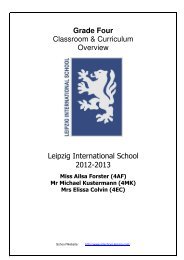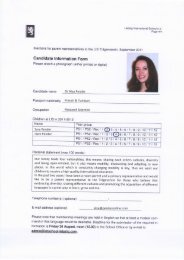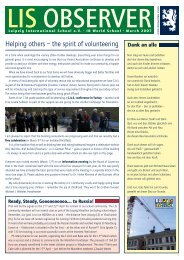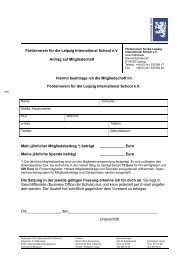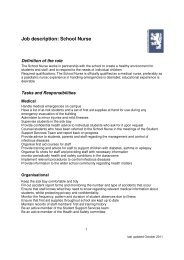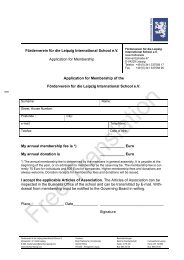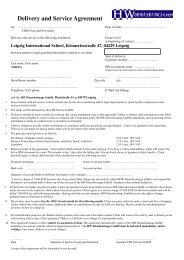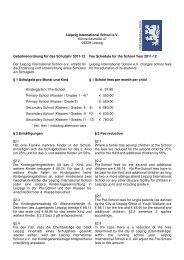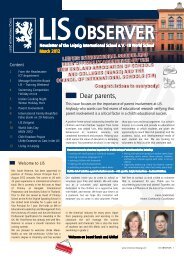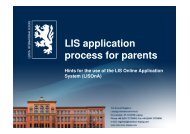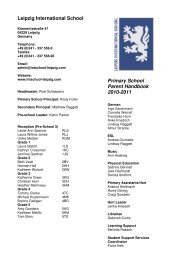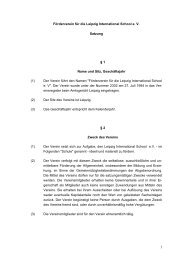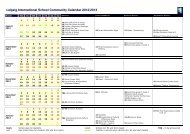(2JG) Mrs Kathleen Wolcott (2KW) Miss Ulrike Metzler - Leipzig ...
(2JG) Mrs Kathleen Wolcott (2KW) Miss Ulrike Metzler - Leipzig ...
(2JG) Mrs Kathleen Wolcott (2KW) Miss Ulrike Metzler - Leipzig ...
You also want an ePaper? Increase the reach of your titles
YUMPU automatically turns print PDFs into web optimized ePapers that Google loves.
• to provide the opportunity for enjoyment, creativity and intellectual stimulation<br />
• to encourage the children to learn by playing different games and having fun<br />
ENGLISH AS A SECOND LANGUAGE (ESL)<br />
The ESL Programme at the Primary School focuses on the 4 language skills (reading, writing,<br />
listening and speaking) in a fun and dynamic way. The goal of the programme is to give students<br />
sufficient English to be able to access content and language within the mainstream classroom, by<br />
teaching them in small groups and providing targeted language instruction. The ESL staff use small<br />
group work, projects, drama, games, and a variety of written materials to practice skills and expose<br />
children to English in a pleasurable, focused environment.<br />
While the focus is on language acquisition, class tasks seek to build up linguistic knowledge around<br />
a theme or content area. Students who are new to English attend specialist ESL classes whereas<br />
more advanced ESL students receive a combination of in-class support as well as specialist ESL<br />
classes. This highly-focused instruction utilises texts and themes studied in the homeroom and is<br />
based on the particular linguistic needs of each student, including areas such as spoken fluency,<br />
structuring effective writing, vocabulary development, and grammatical accuracy.<br />
Because of the proven benefits of developing a strong mother tongue, LIS celebrates and aims to<br />
foster growth in all our students’ languages. English language learners are therefore encouraged to<br />
develop their mother tongue while improving their English proficiency. We are happy to meet with<br />
parents to discuss ways to help your child’s language development.<br />
Please note: due to the confusion that ESL learners might have (for students whose mother<br />
tongue is not German), we reserve the right to refrain from providing GSL lessons until a<br />
B1* stage of English language development is reached.<br />
*As per the Common European Framework. For more information, please visit this website:<br />
http://europass.cedefop.europa.eu/en/resources/european-language-levels-cefr<br />
SPORT<br />
In Reception, Grade One and Grade Two students build on their natural enthusiasm for movement,<br />
using it to explore and learn about their world. They start to work and play with other students in<br />
pairs and small groups. By watching, listening and experimenting, they develop their skills in<br />
movement and coordination, and enjoy expressing and testing themselves in a variety of situations.<br />
PRIMARY LEARNING SUPPORT<br />
The Primary School Learning Support Program is designed for students who will benefit from<br />
additional teaching and study to reach the learning outcomes for their grade level. Students are<br />
withdrawn from their regular classrooms for one period, two or three times each week, to work in a<br />
small group setting with the specialist teacher. Sessions are offered in literacy and numeracy;<br />
encouragement, organisational and study skills are an important part of these classes. In addition,<br />
Learning Support assistants work with students within classrooms.<br />
The Primary Learning Support specialist provides academic assessment for students referred by<br />
teachers and parents. These assessments benefit the student by providing further information that<br />
can be used to design programmes to meet the individual needs of students. The Primary Learning<br />
Support specialist also works with classroom teachers to provide information and ideas that will<br />
support the classroom programme. Parents are encouraged to meet with the Learning Support<br />
Specialist to discuss their child’s programme.<br />
Marlene Heitland, Primary Learning Support Specialist



